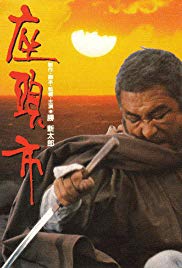
ZATOICHI
Japan, 2003, 116 minutes, Colour.
Beat Takeshi, Tadanoubu Asano.
Directed by Takeshi Kitano.
Zatoichi is a popular legendary figure in Japan. He was the focus of a television series in the 70s and 80s. Takeshi Kitano is one of Japan's best known directors, celebrated right around the world. His is especially noted for his violent films about crime (although he can also do comedy). His best known and acclaimed work is Hana-bi, which won the Golden Lion at Venice in 1997. Kitano is also a strong actor and an illustrator as well as a television personality.
Some of this is evident in his choices of how to portray Zatoichi. He has platinum blond hair, he is blind, he has a red-lacquered cane. He is a remote kind of character, a masseur who wanders the countryside and yet who is a master swordsman. He finds a village which is terrorised by gangs and, staying in the house of a simple woman, he emerges to confront the members of the gang (with computer-generated blood effects which are more than a touch gory) and to save the day by freeing the village of the tyranny of the gangs. In some ways, the plot is reminiscent of Kurosawa's The Seven Samurai (and the American version, The Magnificent Seven). Zatoichi, although he has some help, is the magnificent One.
The film takes up familiar themes from the Samurai days, especially the victimisation of poor people in the countryside and their need for some kind of hero to save them. There is a subplot with two sisters wandering the countryside trying to avenge the leader of the gangs who killed their parents. These combine with Zatoichi for a grand finale.
Kitano is very interested in music and with a scene of farmers working in the field, he choreographs their movements to the sound of the background music, giving a humorous but striking effect. He does it again at the end when we see the builders at work on a new house. This then makes a transition into an extraordinary finale, like a Japanese Riverdance, with a whole troupe of people in festival clothes tap-dancing on a stage. It rounds off a very interesting and spectacular Samurai action adventure film.
1. The popularity of Takeshi Kitano as director and actor? Writing his own screenplays? His presentation of himself in centre screen and imposing characters?
2. The Japanese legends of Zatoichi, the master swordsman, going around the villages helping people? His appearance, his hair, his red cane? His being a gambler? His being blind? The opening and his sitting on the rock, the little boy taking his cane, his confrontation with the gang and destroying them?
3. The musical score, the particular sequences in the field and in the building with the choreography of movement and sound? The impact of the grand finale with the tap-dancing?
4. The presentation of the village, the gang members demanding protection money, the people unable to pay, the violence of the gangs? The bosses and their control? Their greed? The arrival of the Ronin in the village, his rapid swordwork, the demonstration for the boss and the sword between his toes? The woman in attendance? Her illness? Her devotion and not wanting him to take the work? His being employed as a bodyguard?
5. The effect on the townspeople, the old woman and her being harassed by the gangs? Her return home? Her meeting Zatoichi, his carrying the load, her inviting him into the home, his making it his base? Her gambling nephew and his friendship? The young fat man who ran around the houses trying to be a warrior?
6. Zatoichi and his gambling, his going into the town, watching (though blind) the results of the games, his participation, his winnings? His staying with the people and learning of their difficulties?
7. The two sisters, their sitting at the resting place, their sudden killing of the gang member? Their staying in the town, their ability at dancing, their charming the bosses, their waiting their move for revenge? The scenes of dancing, the young girl dancing with them? The irony that one of them was a man? The discovery by the nephew - his questions, the bath, his even trying makeup himself? The finale and the two women going to dance for the bosses, knowing their identities? Their having been tricked, the gang surrounding them, their possible deaths, Zatoichi arriving and saving the day?
8. The bodyguard and his role in the town, his encounter with Zatoichi, Zatoichi fending off his sword? His woman and her continued pleas for him to stop? His wondering whether he could beat Zatoichi?
9. The gang bosses, their ruthlessness, their wealth? The members of the gang and their loyalty, their brutality? Zatoichi and the various confrontations with the gang members, the massacres?
10. The build-up to the confrontation, Zatoichi and his always arriving on time, his swift swordwork? The scene where he was set upon by the gang member to test the sword and his breaking the sword and besting him?
11. The deaths of the gang leaders, his searching out the bosses of bosses, the confrontation, their deaths after taunting him?
12. His return to the house, its being burnt down by the vengeful gangs? The death of the Ronin, his woman killing herself?
13. Japanese tragedy, deaths, fatalism, suicide? The ancient days and the rules of the gangs and the bosses, the impotence of ordinary people? The need for heroes?
14. The scene of the building, brighter, a new life for everybody, freedom? The music to the beat of the builders, the stage, the troupe coming on and tap-dancing, a zestful finale to the film?